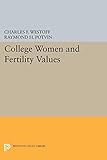College Women and Fertility Values / Charles F. Westoff, Raymond H. Potvin.
Material type: TextSeries: Office of Population Research ; 1969Publisher: Princeton, NJ : Princeton University Press, [2015]Copyright date: ©1967Description: 1 online resource (258 p.)Content type:
TextSeries: Office of Population Research ; 1969Publisher: Princeton, NJ : Princeton University Press, [2015]Copyright date: ©1967Description: 1 online resource (258 p.)Content type: - 9780691623375
- 9781400876051
- 301.3/2 22
- HB903.F4 W4eb
- online - DeGruyter
- Issued also in print.
| Item type | Current library | Call number | URL | Status | Notes | Barcode | |
|---|---|---|---|---|---|---|---|
 eBook
eBook
|
Biblioteca "Angelicum" Pont. Univ. S.Tommaso d'Aquino Nuvola online | online - DeGruyter (Browse shelf(Opens below)) | Online access | Not for loan (Accesso limitato) | Accesso per gli utenti autorizzati / Access for authorized users | (dgr)9781400876051 |
Frontmatter -- Foreword -- Preface -- Contents -- Tables -- Part I. Introduction -- 1. Background, Scope, and Method -- Part II. The Effects of Higher Education -- 2. Types of Colleges and Family-Size Preferences -- 3. Higher Education and Family-Size Preferences -- 4. Higher Education and Family-Planning Intentions -- 5. Higher Education and Fertility Values within Selected Controls -- 6. Higher Education and Some Beliefs about Marriage, Family, and Career -- 7. Conclusions and Discussion of the Effects of Higher Education -- Part III. The Influence of Social Factors and Beliefs -- 8. Social and Personal Characteristics and Fertility Values -- 9. Beliefs, Family-Size Preferences, and Family-Planning Intentions -- 10. Intergroup Distances and Belief Structures -- 11. Multivariate Analyses of Correlates of Family-Size Preferences -- 12. Conclusions and Discussion of Factors Affecting Fertility Values -- Appendix -- Index
restricted access online access with authorization star
http://purl.org/coar/access_right/c_16ec
Has the college experience of women been an influence on the number of children desired and the number and spacing of their children? Do women come to college with their attitudes and values in this regard already formed? This study of 15,000 women, freshmen and seniors in 45 American colleges and universities, both secular and nonsecular, attempts to answer this question and to determine how such characteristics as religious preference, career intentions, and the number of children in her own family influence a woman's fertility values. Attention is paid to an earlier finding that Catholic college graduates have higher fertility than Catholic high school graduates, although higher education is usually associated with lower fertility.Originally published in 1967.The Princeton Legacy Library uses the latest print-on-demand technology to again make available previously out-of-print books from the distinguished backlist of Princeton University Press. These editions preserve the original texts of these important books while presenting them in durable paperback and hardcover editions. The goal of the Princeton Legacy Library is to vastly increase access to the rich scholarly heritage found in the thousands of books published by Princeton University Press since its founding in 1905.
Issued also in print.
Mode of access: Internet via World Wide Web.
In English.
Description based on online resource; title from PDF title page (publisher's Web site, viewed 30. Aug 2021)


